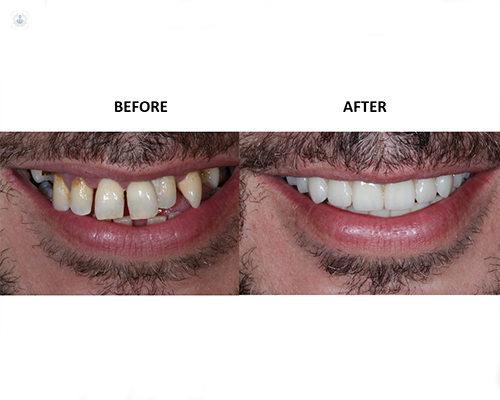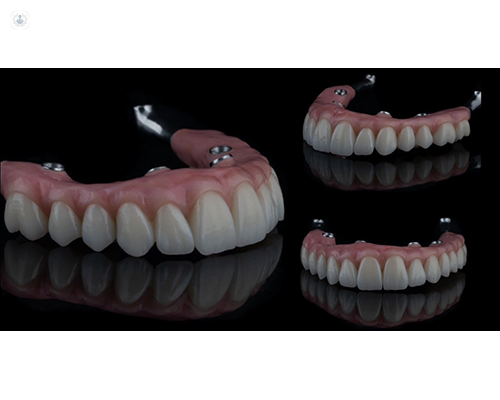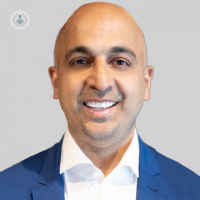Full mouth rehabilitation: Restore your smile and oral health
Escrito por:A full mouth rehabilitation is a transformative dental treatment designed to restore the health, function, and aesthetics of your entire mouth.
Dr Sheraz Aleem, founder of TKC Dental Practice in London and a renowned cosmetic dentist, answers key questions about this comprehensive solution to restore your smile and oral health and provides clarity on what to expect.

What is a full mouth rehabilitation?
A full mouth rehabilitation, also known as a full mouth reconstruction, is a personalised dental treatment plan aimed at treating extensive oral health problems affecting the teeth, gums, jaws, and function of the mouth. These include:
- severely worn, cracked, or broken teeth due to bruxism or acid erosion
- multiple missing teeth that compromise chewing or speaking
- bite alignment issues that cause jaw pain
- chronic dental pain or temporomandibular joint (TMJ) disorder
- advanced gum disease or other periodontal problems
- dental trauma from accidents
The goal of a full mouth rehabilitation is to restore dental function whilst simultaneously improving oral health and aesthetics. Its multiple purposes make it an excellent choice for people looking to regain a healthy and confident smile.
What treatments are included in a full mouth rehabilitation?
A full mouth rehabilitation involves a combination of restorative, cosmetic, and orthodontic dental procedures to restore and rebuild all of the teeth.
Restorative treatments often feature dental crowns, bridges, and fillings to repair damaged teeth. In cases of tooth loss, dental implants or dentures will be used to replace missing teeth. Gum treatments, including scaling and root planning, will be necessary to address periodontal disease.
For people requiring alignment corrections, orthodontic options like braces or clear aligners will be incorporated. Additionally, jaw alignment issues will be resolved through bite correction therapies, helping to alleviate TMJ-related pain. For aesthetic enhancements, veneers or dental bonding will restore the appearance of the teeth, ensuring the results are as visually pleasing as they are functional.
The exact combination will be tailored to each person’s unique needs. In some cases, adjunctive treatments like jaw surgery or facial aesthetic treatments will also be considered.

How is the treatment plan developed?
Creating the treatment plan for a full mouth rehabilitation requires a comprehensive evaluation by a qualified dentist.
The process will begin with an in-depth examination of your mouth (including your teeth, gums, and jaw) using advanced diagnostic tools such as X-rays, 3D imaging, and dental impressions. These will provide a complete picture of your oral health and structural anatomy.
Next, functional assessments like bite analysis and jaw movement evaluations will help uncover issues like TMJ disorders or malocclusion. During this process, your dentist will also take the time to discuss your personal concerns, goals, and medical history to identify specific needs, such as relief from chronic dental pain.
Based on this information, your dentist will develop a step-by-step treatment plan. This plan will detail the necessary dental procedures, the sequence in which these will be carried out, and their estimated timeline for completion. Immediate concerns, such as tooth decay or infections, will be prioritised in the treatment plan, followed by restorative and cosmetic treatments.
What results can I expect from a full mouth rehabilitation?
The results of a full mouth rehabilitation can be life-changing for many people. You can expect improved oral function, including the ability to chew, speak, and smile without discomfort. Chronic pain caused by bite misalignments or TMJ disorders is often alleviated. Additionally, the aesthetic benefits are significant, with a restored and harmonious smile enhancing self-confidence and overall appearance.
The longevity of the results will depend on the materials that were used and your personal oral hygiene practices. High-quality crowns, bridges, and implants can last 10 to 15 years or more with proper care, while components like fillings or bonding will require maintenance or replacement sooner. Regular follow-ups with your dentist are crucial to ensuring your results endure over time.
With proper planning, expert care, and ongoing maintenance, the results of a full mouth rehabilitation will provide long-lasting benefits for both your oral health and quality of life.

If you’re in need of a full mouth rehabilitation, contact TKC Dental Practice today. Message or call (The Kensington Clinic at +44 0 207 603 3008) and (The Knightsbridge Clinic at +44 0 203 131 4222) to explore your options.
In addition, if you would like to book an appointment with Dr Sheraz Aleem, head on over to his Top Doctors profile today.


